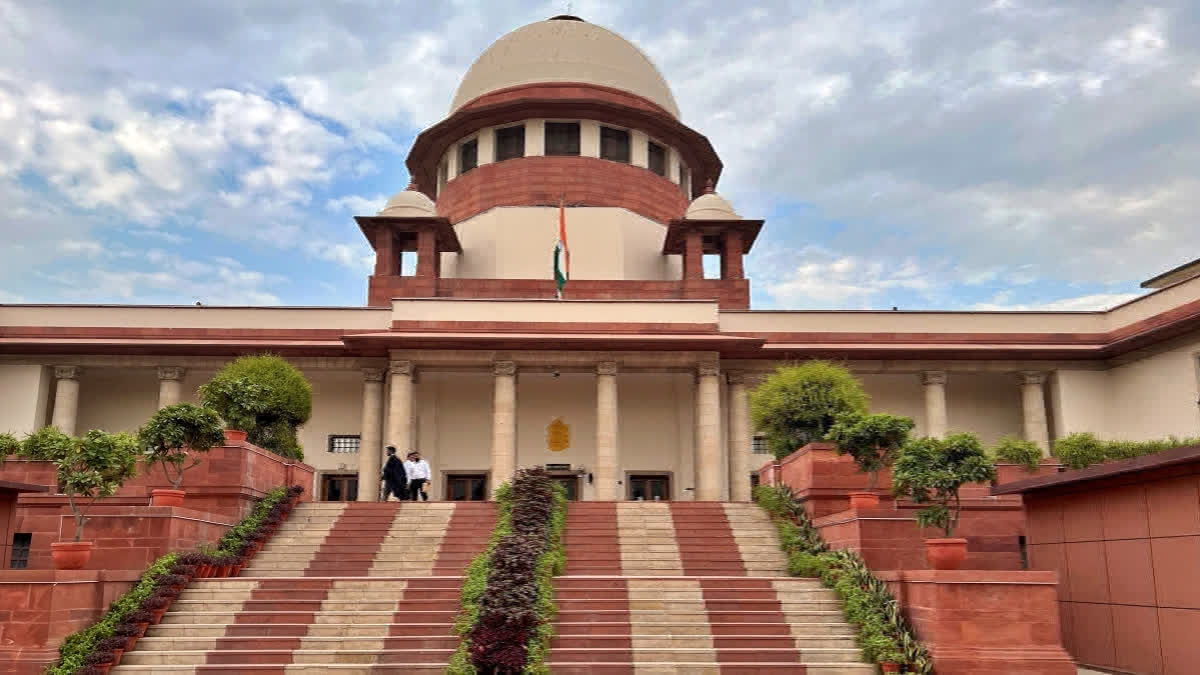New Delhi: The Supreme Court on Thursday said the argument of the Union of India that the electoral bond scheme protects the confidentiality of the contributor akin to the system of secret ballot is erroneous and the 2018 scheme will have to be struck down as unconstitutional.
A five-judge bench led by Chief Justice of India D Y Chandrachud said the question is whether this court should only strike down the non-disclosure provision in the Electoral Bond Scheme, that is Clause 7(4). The bench noted that the anonymity of the contributor is intrinsic to the scheme and it is not distinguishable from other modes of contributions through the banking channels such as cheque transfer, transfer through the electronic clearing system or direct debit if the anonymity component of the scheme is struck down. “Thus, the Electoral Bond Scheme 2018 will also consequentially have to be struck down as unconstitutional”, it said.
The apex court noted that the second issue is whether the right to privacy of political contributions can be extended to include privacy vis-à-vis the political party to which contributions are made, since according to Centre under the scheme, the political party to which the contribution is made would not know the particulars of the contributor. The Centre submitted that the scheme is akin to the secret ballot.
The CJI, who authored the majority judgment on behalf of the bench, said, "We are unable to see how the disclosure of information about contributors to the political party to which the contribution is made would infringe political expression".
The bench said the disclosure of the particulars of the contributions may affect the freedom of individuals to the limited extent that the political party with the information could coerce those who have not contributed to them. “However, we have already held above that the scheme only grants de jure and not de facto confidentiality vis-à-vis the political party. Under the current Scheme, it is still open to the political party to coerce persons to contribute. Thus, the argument of the Union of India that the Electoral Bond Scheme protects the confidentiality of the contributor akin to the system of secret ballot is erroneous”, said the CJI.
Right to information of voter prevails over right to anonymity of political contributions
The apex court noted that the court considered privacy as an essential component for the effective fulfilment of the all-entrenched rights and Article 25 of the Constitution is the only provision in Part III which subjects the right to other fundamental rights. Article 25 guarantees the freedom of conscience which means the freedom to judge the moral qualities of one’s conduct, it added.
“Financial contributions to a political party (as a form of expression of political support and belief) can be traced to the exercise of the freedom of conscience under Article 25." It can very well be argued that the right to information of the voter prevails over the right to anonymity of political contributions which may be traceable to the freedom of conscience recognized under Article 25 since it is subject to all other fundamental rights, including Article 19(1)(a)”, said the bench.
“However, the right to privacy of financial contributions to political parties can also be traced to Article 19(1) because the informational privacy of a person’s political affiliation is necessary to enjoy the right to political speech under Article 19(1)(a), the right to political protests under Article 19(1)(b), the right to form a political association under Article 19(1)(c), and the right to life and liberty under Article 21”, said the bench.
It added: “The Constitution does not create a hierarchy amongst these rights. Thus, there is no constitutional hierarchy between the right to information and the right to informational privacy of political affiliation”.
The Union of India submitted that Clause 7(4) of the electoral bond scheme balances the right to information of the voter and the right to informational privacy of the contributor. Clause 7(4) stipulates that the information furnished by the buyer shall be treated as confidential by the authorized bank and the bank has to disclose the information when it is demanded by a competent court or upon the registration of a criminal case by a law enforcement agency. It needs to be analyzed if the measure employed (Clause 7(4)) balances the rights or tilts the balance towards one of the fundamental rights, said the bench.
“The purpose of securing information about political funding can never be fulfilled by absolute non-disclosure. The measure adopted does not satisfy the suitability prong vis-à-vis the purpose of information of political funding”, said the bench.
“It must be recalled that we have held above that the right to information of the voter includes the right to information of financial contributions to a political party because of the influence of money in electoral politics (through electoral outcomes) and governmental decisions (through a seat at the table and quid pro quo arrangements between the contributor and the political party)”, added the bench.
The apex court said the measure in the electoral bond scheme completely tilts the balance in favour of the purpose of informational privacy and abrogates informational interests.
“The Union of India has been unable to establish that the measure employed in Clause 7(4) of the Electoral Bond Scheme is the least restrictive means to balance the rights of informational privacy to political contributions and the right to information of political contributions. Thus, the amendment to Section 13A(b) of the IT Act introduced by the Finance Act 2017, and the amendment to Section 29C (1) of the RPA are unconstitutional”, said the bench.
Read More
- 'Unconstitutional': Supreme Court Constitution Bench Strikes Down Electoral Bond Scheme
- Electoral Bonds Worth over Rs 16,000 Crore Sold so Far | Here Is How Much BJP Got
- Verdict Will Reinforce Power of Votes over Notes: Cong on SC Judgement on Electoral Bond Scheme
- Electoral Bonds Verdict | 'Contributions Give Seat At Table To Contributor': Excerpts From Landmark SC Judgment



